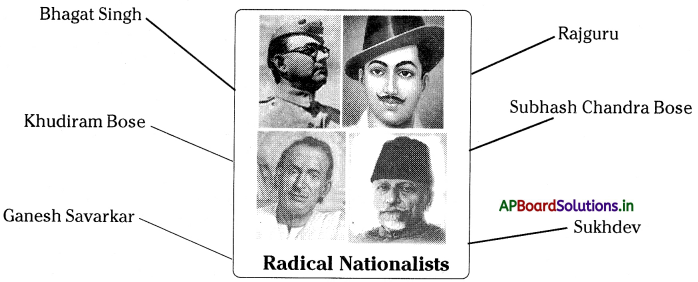Students can go through AP State Board 8th Class Social Studies Notes Chapter 11B National Movement: The Last Phase 1919-1947 to understand and remember the concept easily.
AP State Board Syllabus 8th Class Social Studies Notes Chapter 11B National Movement: The Last Phase 1919-1947
→ Gandhiji arrived in India in 1915 from South Africa. He was already a respected leader known internationally.
→ His earliest interventions were in local movements in Champaran and Kheda.
→ He did not associate with any Congress faction. He built his own political program and space in nationalist politics.
→ Muslim League was formed in 1906 and Hindu Mahasabha in 1915.
→ During Rowlatt Satyagraha the participants tried to ensure that Hindus and Muslims were united in the fight against British rule.
→ The Non-Cooperation Movement gained momentum through 1921-22.
→ Guntur District was at the center of nationalist activity and the participation was very widespread.
→ Sometimes people thought of Gandhiji as someone who could help them overcome their misery and poverty.
![]()
→ On March 13th, 1930 Gandhiji led his March to Dandi village to break the government salt laws. A wave of enthusiasm swept the country.
→ The combined struggles of the Indian people bore fruit when the Government of India Act of 1935 prescribed provincial autonomy.
→ Subhash Chandra Bose organized the Indian National Army (INA) with the cooperation of Rash Bihari Bose in Burma and Andamans.
→ The period after 1940 was characterized by intensive activities of radical organizations.
→ Louis Mountbatten, who was appointed Viceroy in early 1947 was not able to resolve the differences between the Muslim League and the Congress party.
→ Independence is our strength. Partition is our failure.
→ Nationalism: Patriotic feeling often to an extensive degree
→ Secular: Not religious or spiritual
→ Terrorist: A person who uses violence and intimidation in the attempt to achieve political aims unofficially
![]()
→ extremism: Holding extreme political or religious views
→ Satyagraha: True anger. It was introduced and led by Gandhiji in our Independence movement.
→ Non-Cooperation: Not rendering co-operation to the government by not accepting their policies, not obeying their orders, and not paying taxes, etc.
→ Civil Disobedience: Refuse to be obedient by the people of a nation
→ Subcontinent: The land or a country that has all the characteristics of a continent

